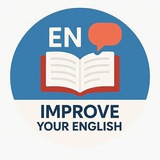📚 Grammar Tip of the Day! 📝
🔹 What’s the difference between “Since” and “For” in Present Perfect? 🤔
✅ Since – We use it with a specific point in time.
🔹 Example: I have lived here since 2010.
✅ For – We use it with a duration of time.
🔹 Example: I have lived here for 14 years.
💡 Remember:
❌ I have known him for 2005. (Incorrect 🚫)
✔️ I have known him since 2005. (Correct ✅)
Drop a comment with your own example sentences! ⬇️💬
@ingliztiliuzz
🔹 What’s the difference between “Since” and “For” in Present Perfect? 🤔
✅ Since – We use it with a specific point in time.
🔹 Example: I have lived here since 2010.
✅ For – We use it with a duration of time.
🔹 Example: I have lived here for 14 years.
💡 Remember:
❌ I have known him for 2005. (Incorrect 🚫)
✔️ I have known him since 2005. (Correct ✅)
Drop a comment with your own example sentences! ⬇️💬
@ingliztiliuzz
❤13😁1🤣1
Can you guess the daily activities?
1️⃣🌞 + 🛌 = ?
👍 Wake up
❤️ Sleep in
🥰 Make the bed
1️⃣
👍 Wake up
❤️ Sleep in
🥰 Make the bed
Please open Telegram to view this post
VIEW IN TELEGRAM
👍48❤4
Can you guess the daily activities?
2️⃣☕️ + 🍩 = ?
👍 Grab a coffee
❤️ Have breakfast
🥰 Snack break
2️⃣
👍 Grab a coffee
❤️ Have breakfast
🥰 Snack break
Please open Telegram to view this post
VIEW IN TELEGRAM
❤48👍4🥰4
Can you guess the daily activities?
3️⃣ 💻 + 📝 = ?
👍 Study
❤️ Work
🥰 Take notes
3️⃣ 💻 + 📝 = ?
Please open Telegram to view this post
VIEW IN TELEGRAM
🥰28❤6👍4
Can you guess the daily activities?
4️⃣ 🏋️ + 🎵 = ?
👍 Exercise
❤️ Dance
🥰 Go for a walk
4️⃣ 🏋️ + 🎵 = ?
👍 Exercise
❤️ Dance
🥰 Go for a walk
👍41❤3🥰3
Can you guess the daily activities?
5️⃣ 🌃 + 📱 = ?
👍 Watch TV
❤️ Scroll social media
🥰 Go to sleep
5️⃣ 🌃 + 📱 = ?
👍 Watch TV
❤️ Scroll social media
🥰 Go to sleep
❤31🥰3👍1
Here are the answers:
1️⃣ 🌞 + 🛌 = a) Wake up
2️⃣ ☕ + 🍩 = b) Have breakfast
3️⃣ 💻 + 📝 = b) Work
4️⃣ 🏋️ + 🎵 = a) Exercise
5️⃣ 🌃 + 📱 = b) Scroll social media
1️⃣ 🌞 + 🛌 = a) Wake up
2️⃣ ☕ + 🍩 = b) Have breakfast
3️⃣ 💻 + 📝 = b) Work
4️⃣ 🏋️ + 🎵 = a) Exercise
5️⃣ 🌃 + 📱 = b) Scroll social media
❤8
🗣️ “Don’t be a Karen”
Meaning: Don’t complain unnecessarily or act entitled and rude, especially to staff.
(Internet slang; informal. Can sound offensive if used seriously.)
😲 Examples:
• Relax, it’s just a small mistake — don’t be a Karen.
• He asked to speak to the manager again. Don’t be a Karen.
• Let’s be polite — no need to be a Karen.
#english_usage
@ingliztiliuzz
Meaning: Don’t complain unnecessarily or act entitled and rude, especially to staff.
(Internet slang; informal. Can sound offensive if used seriously.)
• Relax, it’s just a small mistake — don’t be a Karen.
• He asked to speak to the manager again. Don’t be a Karen.
• Let’s be polite — no need to be a Karen.
#english_usage
@ingliztiliuzz
Please open Telegram to view this post
VIEW IN TELEGRAM
❤2
Count somebody in
✨To include somebody in an activity
Liz
: Do you want to go swimmingwith us tomorrow?
Mark: Yes, count me in.
Count somebody out
✨To not include somebody in an activity
Liz: Scuba diving?
Carmen: Oh no, count me out - I hate being under water!
Count on somebody
✨To be confident that you can depend on someone
Ravi: I need some help with my interview preparation.
Vishnu: You can count on me.
@ingliztiliuzz
🔥12❤1
This media is not supported in your browser
VIEW IN TELEGRAM
Some people look alike, but this bird looks like a human 😄
Can you guess who?
Can you guess who?
🤣19😁11🤗2
#english_usage
2 hours vs 2-hour
What’s the difference?
⏱️ 2 hours = duration
The movie lasted 2 hours.
✏️ 2-hour = adjective (before a noun)
It was a 2-hour movie.
Rule:
Use a hyphen and singular form before a noun:
✔️ a 3-hour trip
❌ a 3-hours trip
Follow us:
Telegram | Instagram | YouTube
2 hours vs 2-hour
What’s the difference?
⏱️ 2 hours = duration
The movie lasted 2 hours.
✏️ 2-hour = adjective (before a noun)
It was a 2-hour movie.
Rule:
Use a hyphen and singular form before a noun:
✔️ a 3-hour trip
❌ a 3-hours trip
Follow us:
Telegram | Instagram | YouTube
❤4👍1🔥1🥰1
This media is not supported in your browser
VIEW IN TELEGRAM
An Iranian director's one-minute film amazed the world.
MOTHER😢
MOTHER😢
❤3👍2🥰1
